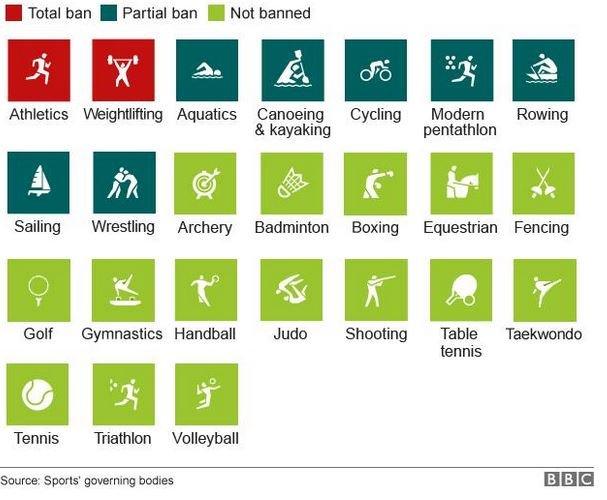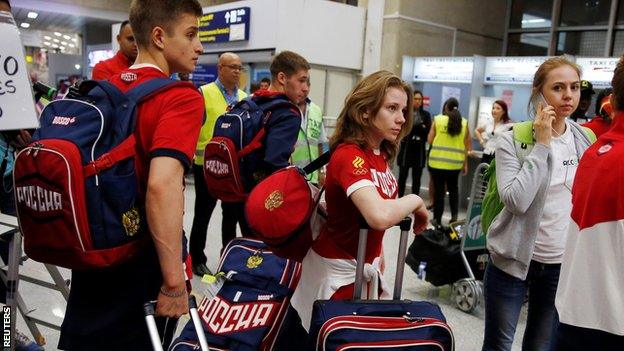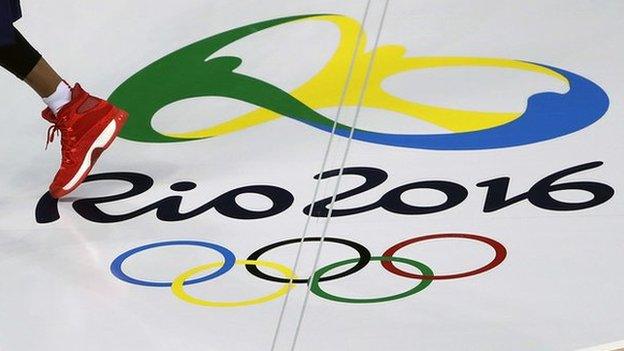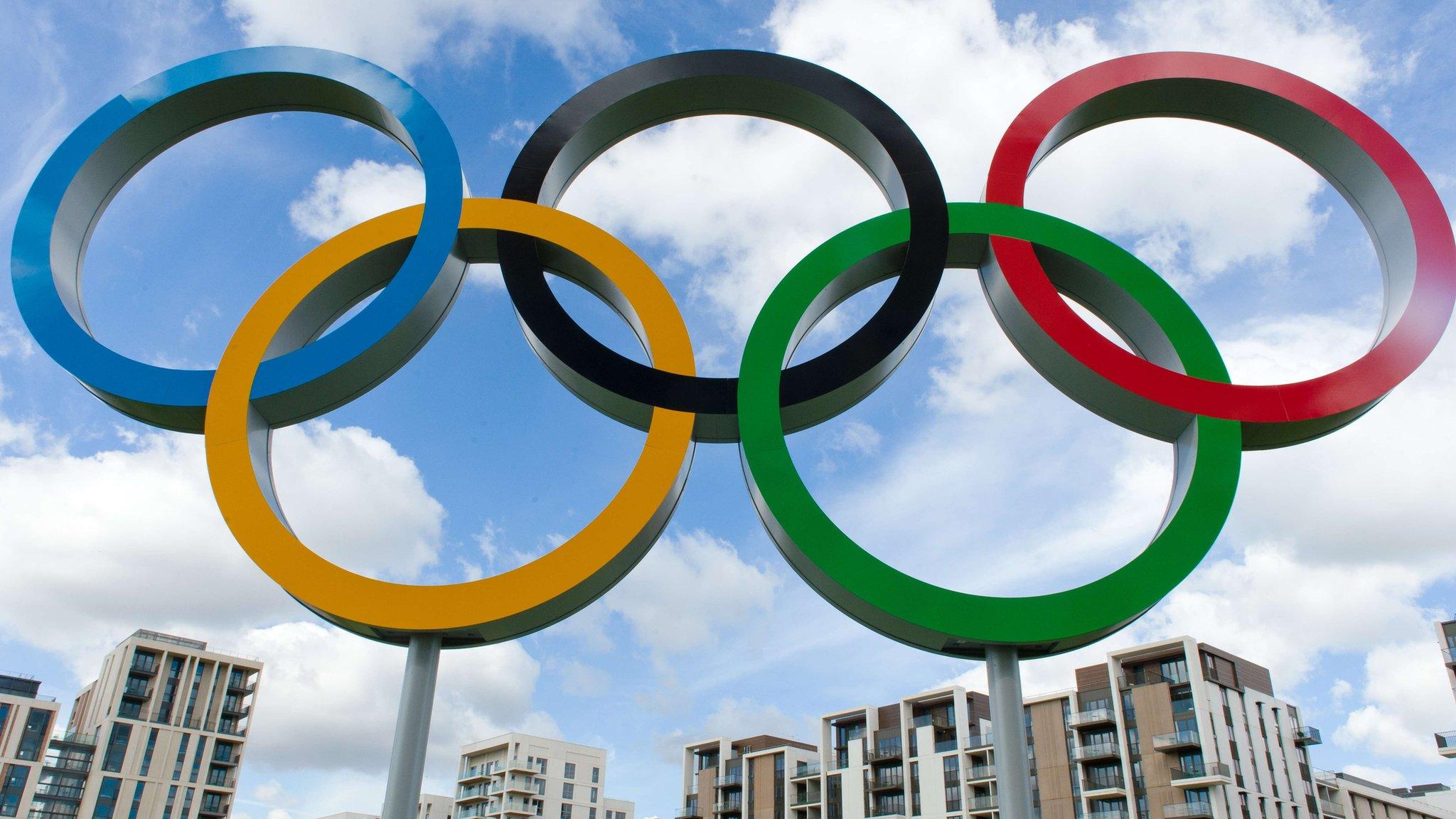Thomas Bach: No regrets over Russia at Rio 2016 - IOC president
- Published
IOC chief Bach has 'no regrets' over Russia ruling
The president of the International Olympic Committee (IOC) Thomas Bach says he has "no regrets" about letting Russia compete at the Rio Games this summer, despite a state-sponsored cheating programme.
In an exclusive interview with the BBC, Bach stands by his handling of the crisis, but admits there are "deficiencies" in the current anti-doping system.
Speaking at a meeting of the Association of National Olympic Committees in Doha, the German pledged to increase funding in the fight for clean sport, if the World Anti-Doping Agency (Wada) was reformed.
Meanwhile, Bach said he was considering a request to appear at a hearing next month of a US Congressional committee investigating anti-doping.
The 62-year-old also insisted that the Rio Games had been a "great success" despite a troubled build-up and concerns over the cost of staging the event.
"Achieving this under extremely difficult circumstances to make it the most watched Games in history is a great demonstration of the relevance and success of the Olympics," he said.

Only the federations for athletics and weightlifting fully banned Russian athletes from competing at Rio 2016
The IOC has been heavily criticised for resisting calls from Wada to impose a blanket ban on the Russian team in the wake of a damning report by Professor Richard McLaren into systemic, state-assisted cheating and the manipulation of samples.
In August, Bach rejected this as a "nuclear option" and instead gave responsibility to international federations to make decisions about their specific sport. The IAAF, athletics' world governing body, had already banned the country's track and field athletes, but hundreds of Russians competed in Rio, with the team coming fourth in the medal table.
When asked if he had any regrets, Bach said: "In general, no. Take the Russian decision; we have such broad support within the Olympic movement, the national Olympic committees, the international federations, the major athlete representatives, and in the political world, where this decision was highly appreciated.
"I was always sure, because with this decision we were defending our values and I always was sure we should not take a political decision. We should take a decision for sport, a decision which is doing justice to the athletes.
"If you are convinced of your values then you can also weather a storm because you know in the long run - once the dust has settled and the storm is over - then the people will realise that the values have been respected. This is why in this point I don't have any regrets."
McLaren's second report into Russian doping at the Sochi 2014 Winter Games is expected early next month with speculation it could lead to pressure for further sanctions against the country for the 2018 Games in Pyeongchang, South Korea.
When asked how long it could take before Russia could be trusted again, Bach said: "That depends on the report because I don't know what's going to happen.
"We have to wait and then anticipate this final report of the IOC as we've created two commissions who will also give the Russian side a chance to be heard. This is a fair procedure and then the IOC will take all of the necessary measures and sanctions."

On the eve of the Olympics, 271 of the 389 athletes Russia wanted to send to Rio had been cleared to compete
Wada holds a board meeting in Glasgow this weekend where there will be an attempt to agree a new roadmap for reforms to the global anti-doping system. Some in the anti-doping community want the agency to be strengthened and empowered with greater independence and sanctioning power.
However, Bach said: "I strongly believe that the prosecutor should never be the judge and this is why the IOC made sanctioning independent - we delegated it to the Court of Arbitration for Sport to have a clear separation of power. This separation of power should also be applied in the fight against doping."
The IOC, which contributes around half of Wada's $30m (£24m) annual budget, matching funding from governments, has come under pressure to give more money to the fight for clean sport.
On his vision for the future of anti-doping, Bach said he wanted "a Wada anti-doping system which is independent from the sports organisations as well as from national interests, where an independent entity determines with the international federations an anti-doping programme, not only for each sport but also each discipline, to ensure a level playing field and to make this transparent for all athletes".
Asked if the system is broken, he said: "It has its deficiencies.
"These have to be corrected and this is why we're making these far-reaching proposals - and if it needs more investment we are ready, the Olympic movement is ready.
"This is why we have said we want reforms to be approved and implemented and then we are ready with governments to provide the necessary financing - you cannot just give money and wait to see what someone will do or not do. I'm confident the athletes will regain their trust in Wada and the anti-doping system."
Meanwhile, the BBC has learned that Bach has been asked to appear next month in front of an investigations hearing of the US House of Representatives' Committee on Energy and Commerce - whose jurisdiction includes funding for US anti-doping and oversight of sports.
"We are carefully considering all of the invitations we get from all over the world," said Bach.
A Wada independent observers report recently highlighted "serious failings" with the IOC's anti-doping programme at the Rio Games. It found that many athletes who had been targeted for testing could not be found and on some days, 50% of tests were aborted. More than 4,000 athletes had no record of any testing in 2016.
Despite this, Bach said: "Overall there was progress in the fight against doping and overall the integrity of the tests was not affected, so we are not happy with the challenges, but on the other hand we did deliver a reliable programme."
Russia is continuing to host winter sports events, despite the IOC urging sports to look for alternative venues following the doping scandal and to freeze any preparations for major championships in the country.
In September however, Russia was awarded the 2021 Biathlon World Championships.
"This is something the IOC cannot impose," said Bach. "The international federations are autonomous from the IOC, we can only give guidelines."
- Published28 October 2016

- Published20 September 2016
- Published18 July 2016
